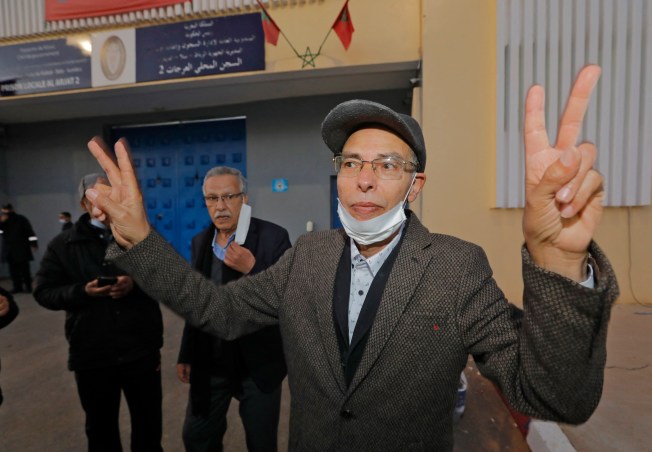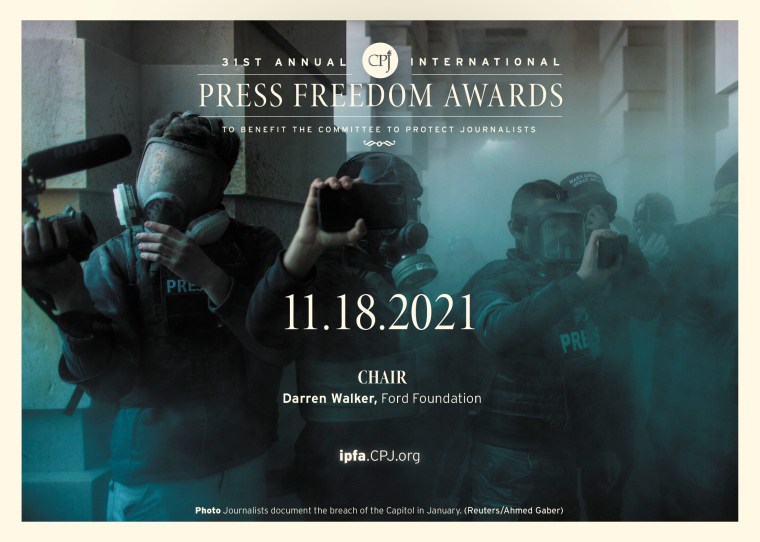CPJ turns 40!
On April 3, 1981, three journalists in New York—Michael Massing, Victor Navasky, and Laurie Nadel—filed the certificate of incorporation for a new organization, the Committee to Protect Journalists, which was dedicated to the defense and promotion of the “human and professional rights of journalists around the world.”
Forty years later, we remain steadfast in our mission. We protect press freedom, defend journalists, and uphold people’s right to access information.
Thank you for all of your help and your generous support over the years.
CPJ announces Reuters Photojournalism Gallery

CPJ and Reuters are hosting a virtual event in April to launch the Reuters Photojournalism Gallery, which will be based in CPJ’s headquarters in New York.
The gallery will showcase Reuters news photography on some of the most challenging and inspiring moments of our time. The installations will change twice a year and will aim to raise awareness of the vital need of photojournalism in documenting history.
The event on April 21, at 9:30 am EDT, will highlight the work of photojournalists and the challenges they face. Reuters North America Pictures Editor Corinne Perkins will join Reuters photojournalists Adrees Latif, Leah Millis, and Goran Tomasevic and CPJ Emergencies Director María Salazar Ferro to discuss the importance of photojournalism, the impact of photography, and why press freedom is critical to a democratic society.
Stay tuned for CPJ’s 2021 awards ceremony

On November 18, CPJ will host its 2021 International Press Freedom Awards ceremony, our annual event that honors journalists who put their lives on the line to bring us the news.
Stay tuned to learn more about our awardees. Meanwhile, check out ipfa.cpj.org and save the date!
Journalists should be allowed access on the U.S. border

In a report on March 22 for The Washington Post, Getty Images photographer John Moore detailed how he was forbidden from covering U.S. Customs and Border Protection agents’ encounters with migrants at the border. Instead, he wrote, he “had to do so from the Mexican side of the border.”
“Until now,” he went on, “journalists haven’t had to stand in another country to cover what is happening in the United States.”
The next day, CPJ issued a strong statement, calling on the U.S. Department of Homeland Security to allow journalists access to detention facilities and border patrol activities along the U.S.-Mexico border. We cited recent cases of journalists who had been barred from entering the detention facilities, including Moore’s. “The Biden administration promised greater transparency—including on the issue of immigration,” we wrote. “It’s time for officials to live up to those promises.”
In 2018, CPJ published a report, “Nothing to Declare,” and a documentary that highlighted the harassment of journalists at U.S. borders, including extra screenings of journalists and searches of their devices without a warrant. We also met several times with the assistant commissioner of the U.S. Customs and Border Protection. Late last year, we outlined in a proposal to the Biden administration ways that the U.S. can restore its leadership on press freedom—both abroad and here at home.
Journalists freed in Puntland, Myanmar, and Morocco
One of the most important things that CPJ does is help get journalists out of jail. We report on their detentions, we call the police and speak to their family and colleagues, and we conduct advocacy—often in close tandem with our partners and their news organizations—calling for their release. Here are a few recent wins.

Back in December, Moroccan journalist Maati Monjib was arrested while dining with a friend in Rabat, and a judge ordered him transferred to prison while he was investigated for money laundering. In late January, he was convicted of fraud and endangering state security and sentenced to a year in prison and a hefty fine. CPJ was unable to determine what, if any, of Monjib’s writing could have drawn the attention of the authorities. However, the journalist had faced official harassment for years.
On March 4, Monjib began a hunger strike in prison. On March 23, a judge ordered his provisional release from prison.

Meanwhile, AP reporter Thein Zaw was detained in Myanmar on February 27 while he was covering a demonstration against the country’ military junta in Yangon. He was charged under Section 505(a) of the country’s penal code, which criminalizes the circulation of information that could cause government employees or soldiers to mutiny. If convicted, he faced up to three years in prison. His pre-trial detention was extended until March 24.
While in court that day, the judge announced that charges were being dropped because the journalist was doing his job when he was arrested, according to the AP citing the journalist. Thein Zaw said his mother told him, “We thought we’d never see you again.”
Kilwe Adan Farah, who was arrested in December 2020 in Garowe, the capital of the semiautonomous region of Puntland in Somalia, went on a hunger strike for two days, when authorities allowed him to speak to his mother so she could “beg him to eat.”
At first, Kilwe was held at an undisclosed location, unable to see his family or lawyer, until mid-January. In the days leading up to his arrest, his outlet had aired criticism of the regional government. He was initially accused by a military court of murder and attempted murder, charges that CPJ said were fabricated. He was ultimately sentenced to three years in prison on undisclosed charges.
On March 22, Kilwe was freed by a presidential pardon.
Must-reads
In a rare interview, 64 Tianwang journalist Wang Jing recounted to our China correspondent her traumatic imprisonment in China—and the torture she allegedly faced. “I had escaped death,” she said.
Moroccan authorities are using trumped-up sexual assault and “morals” charges to retaliate against journalists for their reporting, a new feature by our Middle East and North Africa correspondent finds.
Journalists in Kyrgyzstan tell CPJ’s Europe and Central Asia researcher on how they have been targeted online, often by “fakes”—social media accounts created under false names with stolen or stock photographs.
CPJ in the news
“Egypt is holding my cousin hostage,” Newsweek
“Hindu journalist killing sparks protests in Pakistan,” India Blooms
“Online harassment is ugly and routine for women in journalism,” The Hill
“Puntland journalist freed from prison after receiving pardon,” Hiiraan Online
“Colombia: Jineth Bedoya, reporter assaulted by militia, faces new hurdle in quest for justice,” The Wire
